
"Woodstock" is a song written by Canadian-American singer-songwriter Joni Mitchell. At least four versions of the song were released in 1970. Mitchell's own version was first performed live in 1969 and appeared in April 1970 on her album Ladies of the Canyon and as the B-side to her single "Big Yellow Taxi". A version by Crosby, Stills, Nash & Young appeared on their album Déjà Vu in March 1970 and became a staple of classic rock radio and the best-known version of the song in the United States. A third version, by the British band Matthews Southern Comfort, became the best-known version in the United Kingdom and was the highest charting version of the song in the UK, reaching the top of the Singles Chart in 1970. A fourth version by studio project the Assembled Multitude also became a chart hit.

"Stoned Love" is a 1970 hit single recorded by The Supremes for the Motown label. It was the last Billboard Pop Top Ten hit for the group, peaking at number seven, and their last Billboard number-one R&B hit as well, although the trio continued to score top ten hits in the UK into 1972. In the UK, it was the post-Ross Supremes' biggest hit, reaching number 3 in the singles chart. The single spent six weeks in the UK top ten and five weeks in the US top ten. The BBC ranked "Stoned Love" at number 99 on The Top 100 Digital Motown Chart, which ranks Motown releases solely on their all time UK downloads and streams.
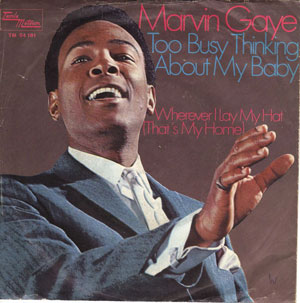
"Too Busy Thinking About My Baby" is a Motown song written by Norman Whitfield, Barrett Strong, and Janie Bradford. The song was first recorded by The Temptations as a track on their 1966 album Gettin' Ready. Eddie Kendricks sings lead on the recording, which was produced by Whitfield. Jimmy Ruffin also recorded a version with The Temptations providing background vocals in 1966. It remained unreleased until 1997.

"I Write the Songs" is a popular song written by Bruce Johnston in 1975 and released on his album Going Public in 1977. Barry Manilow's version reached number one on the Billboard Hot 100 chart in January 1976 after spending two weeks atop the Billboard adult contemporary chart in December 1975. It won a Grammy Award for Song of the Year and was nominated for Record of the Year in 1977. Billboard ranked it as the No. 13 song of 1976.

"Proud Mary" is a song by American rock band Creedence Clearwater Revival, written by vocalist and lead guitarist John Fogerty. It was released as a single in January 1969 by Fantasy Records and on the band's second studio album, Bayou Country. The song became a major hit in the United States, peaking at No. 2 on the Billboard Hot 100 in March 1969, the first of five singles to peak at No. 2 for the group.
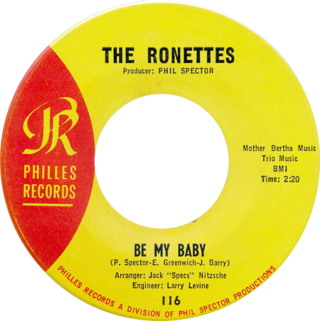
"Be My Baby" is a song by American girl group the Ronettes that was released as a single on Philles Records in August 1963. Written by Jeff Barry, Ellie Greenwich, and Phil Spector, the song was the Ronettes' biggest hit, reaching number 2 in the U.S. and number 4 in the UK. It is often ranked as among the best songs of the 1960s, and has been regarded by some publications as one of the greatest songs of all time.
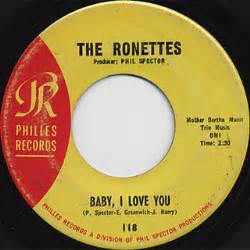
"Baby, I Love You" is a song originally recorded by the Ronettes in 1963 and released on their debut album Presenting the Fabulous Ronettes (1964). The song was written by Jeff Barry, Ellie Greenwich, and Phil Spector, and produced by Spector.

"I Can Hear Music" is a song written by Jeff Barry, Ellie Greenwich and Phil Spector for American girl group the Ronettes in 1966. This version spent one week on the Billboard Pop chart at number 100. In early 1969, the Beach Boys released a cover version as a single from their album 20/20 (1969), peaking at number 24 in the US.
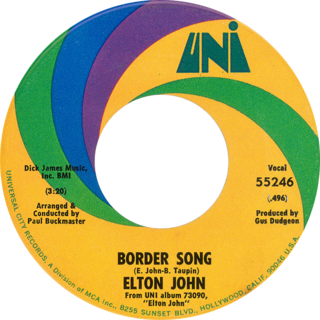
"Border Song" is a song by Elton John with music by John and lyrics by Bernie Taupin. The song initially appeared on the 1970 album Elton John, and was released in the spring of 1970 as the LP's first single. After failing to chart in the UK, it was released in North America a few months later. It met with more success there, especially in Canada, where it peaked at No. 34. The appearance of "Border Song" on the Canadian charts was John's first chart appearance in any country.
"Let's Get Together", also known as "Get Together" and "Everybody Get Together", is a song written in the mid-1960s by the American singer-songwriter Chet Powers, from the psychedelic rock band Quicksilver Messenger Service. A hit version by the Youngbloods, included on their 1967 debut album The Youngbloods, peaked at No. 5 on the Billboard Hot 100 in 1969.

"Oh Girl" is a song written by Eugene Record and recorded by American soul vocal group the Chi-Lites, with Record on vocals and also producing. It was released as a single on Brunswick Records in 1972. Included on the group's 1972 album A Lonely Man, "Oh Girl" centers on a relationship on the verge of break-up.
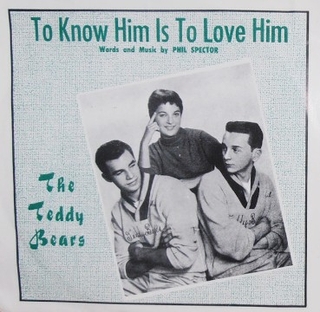
"To Know Him Is to Love Him" is a song written by Phil Spector, inspired by the words on his father's gravestone, "To Know Him Was to Love Him". It was first recorded by the only vocal group of which he was a member, The Teddy Bears. The single spent three weeks at No. 1 on the Billboard Hot 100 chart in 1958, while reaching No. 2 on the UK's New Musical Express chart. Peter & Gordon and Bobby Vinton later each experienced chart success with the song, in 1965 and 1968, respectively.

"Song Sung Blue" is a 1972 hit song written and recorded by Neil Diamond, inspired by the second movement of Mozart's Piano Concerto #21. It was released on Diamond's album Moods, and later appeared on many of Diamond's live and compilation albums. The song was a #1 hit on the Billboard Hot 100 chart in the United States for one week, the week of July 1, and it spent twelve weeks in the Top 40. It also reached #14 on the UK Singles Chart.

"Spinning Wheel" is a song recorded in 1968 by Jazz fusion/Rock band Blood, Sweat & Tears; it was written by Canadian lead vocalist David Clayton-Thomas and included on their eponymous album, released in 1968.

"(The Best Part of) Breakin' Up" is a song written by Phil Spector, Pete Andreoli and Vince Poncia. It was first recorded by the Ronettes, produced by Phil Spector and arranged by Jack Nitzsche with Ronnie Spector on lead vocals and with backing vocals by Nedra Talley and Estelle Bennett, ably abetted by Darlene Love and the Blossoms, Bobby Sheen, and Sonny & Cher. The song was released in April 1964, the year widely recognized as the group's most successful year, and proved to be the group's third consecutive top forty hit in the US. The single peaked at number 39 on the U.S. Billboard Hot 100 and number 43 on the UK Singles Chart.
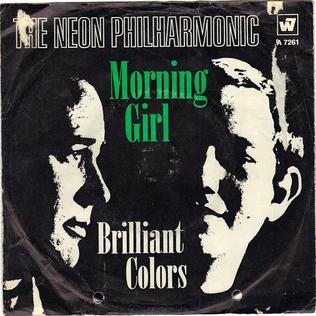
"Morning Girl" is a 1969 song by The Neon Philharmonic. It was a hit in Canada and the United States. The recording featured a chamber-sized orchestra of Nashville Symphony Orchestra musicians, and the project was headed by composer Tupper Saussy and vocalist Don Gant.
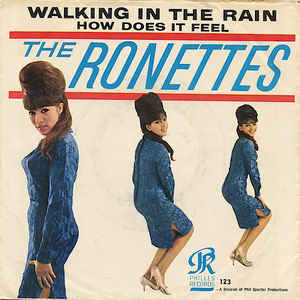
"Walking in the Rain" is a song written by Barry Mann, Phil Spector, and Cynthia Weil. It was originally recorded by the girl group the Ronettes in 1964 who had a charting hit with their version. Jay and the Americans released a charting hit cover of the song in 1969. The song has since been recorded by many other artists over the years, including the Walker Brothers.
"With Pen in Hand" is a song written by Bobby Goldsboro and first released on his March 1968 album, Honey. The song's lyrics address the subjects of divorce and losing custody of one's child, and are sung from the perspective of the parent who expects to be losing custody of their child, as they make a final plea to their spouse to reconcile before the divorce is finalized. "With Pen in Hand" has been a hit for multiple artists in the late 1960s and 1970s.

"You'll Never Get to Heaven (If You Break My Heart)" is a song composed by Burt Bacharach, with lyrics by Hal David. It was originally recorded by Dionne Warwick in 1964, who charted at number 34 in the US Billboard Hot 100 with her version. It was covered by the Stylistics in 1973, who reached number 23 in the US with their cover.

"Do I Love You?" is a song written by Phil Spector, Pete Andreoli and Vini Poncia. It was recorded by American girl group the Ronettes in 1964 and released on their debut album Presenting the Fabulous Ronettes.



















